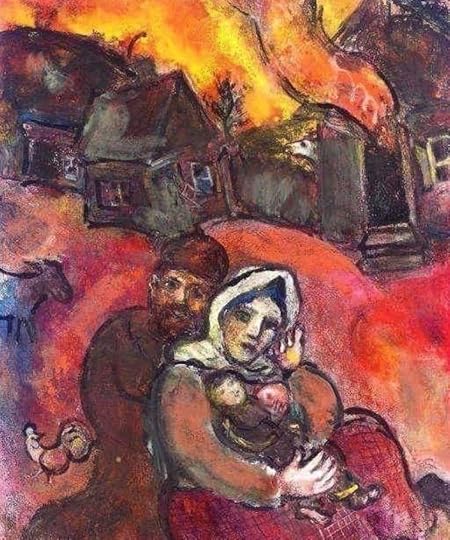Martin Shaw's Blog, page 8
June 7, 2022
On the single market – and freedom of movement
May 9, 2022
New podcast about my book ‘Political Racism’
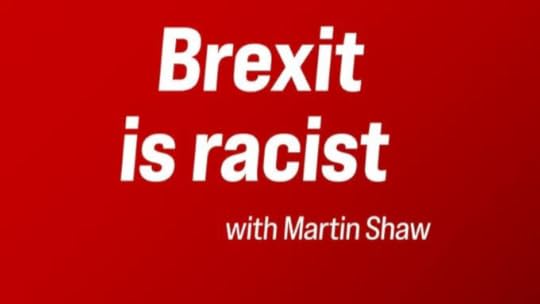 I’ve talked about ‘Political Racism’ in a great Another Europe is Possible PODCAST with Luke Cooper and Zoe Williams.
I’ve talked about ‘Political Racism’ in a great Another Europe is Possible PODCAST with Luke Cooper and Zoe Williams.And a bonus – listeners to the podcast get a 30% discount on the book when they use the code EMAIL30 at the Agenda Publishing website.
April 19, 2022
The Rwanda Scheme: Electoral Racism to Policy Racism

My latest for Byline Times
Boris Johnson and Priti Patel’s scheme to deport asylum seekers is so outrageous that critics are struggling to take it at face value. They doubt that deportees will ever reach Rwanda and see it as a ‘dead cat’ to distract from the Prime Minister’s unprecedented penalty notices. Or they are viewing it as a means to incite legal action, which Boris Johnson will use as more ‘culture war’ red meat.
But systematic cruelty has long been fundamental to the UK’s immigration and asylum system. And outlandish proposals – such as the Government’s recently announced plan to send asylum seekers to Rwanda – have a habit of turning this into practice. Before Johnson came to power, the ‘hostile environment’ developed under David Cameron and Theresa May produced the deportation and deaths of many British citizens in the Windrush scandal.
Beyond the attempt to deflect from Johnson’s many embarrassments, this policy racism against vulnerable refugees emerges from the cynical calculus of electoral racism which has long informed Conservative strategy.
Since the idea of ‘immigrants’ was first racialised in the 1950s, the right – backed by the tabloids and appeased by Labour – has ratcheted up and down its hostility to migrants and minorities according to its political needs. This political racism was central – as I show in my new book – to Johnson’s 2016 Brexit victory and his subsequent rise to power.
Ukrainian refugees fleeing Vladimir Putin’s war are currently winning sympathy even from the Conservatives, but the Government’s response has been parsimonious at best. While Johnson relishes photo opportunities in Kyiv, he has little interest in helping the war’s victims. Outsourcing their care to homeowners through the ‘Homes for Ukraine’ scheme may seem generous compared to the treatment of other refugees, but the main policy aim has been to keep the numbers of Ukrainians who make it to the UK to a minimum.
Ukraine poses dilemmas for Boris Johnson: the war has meant that he wants Britain to be seen as part of the West, but to keep its distance from the EU. He wants the UK to appear sympathetic to Ukrainians, but his Government continues to pander to the anti-immigrant core among his MPs, party members and voters. His Immigration Minister suggested that if Ukrainians want to come to the UK, they should apply to pick fruit; while another Tory MP said that “we have done our bit” on immigration from eastern Europe.
Despite this, many hoped that public support for Ukrainians, reinforcing a slow liberalisation of attitudes to immigration, would push the Government into a more liberal policy overall. The Rwanda scheme is its clear answer to that. Brexit hostility to immigrants was barely under the surface as Boris Johnson evoked the need to ‘control’ over borders at its launch.
The Nigel Farage-Daily Mail diet of attacks on east Europeans – who former Conservative Leader Iain Duncan Smith called “very low-value, low-skilled people” as the UK left the EU – may now have been suspended. But it is open season on vulnerable groups who are not this month’s worthy victims. No surprise then that Johnson has targeted the desperate people arriving on our Channel shores – who Farage, the tabloids and Priti Patel herself have turned into the ultimate undesirables.
The combination of a grudging welcome for a small number of Ukrainians and the state trafficking to Rwanda of refugees arriving in dinghies reflects how political racism works in the Brexit era. Racism is selective by definition but, like yesterday’s UKIP, today’s Conservative Government adopts a distinctive ‘pick and mix’ approach that defies simple ideas about how racism works.
The blatant anti-black racism of Enoch Powell is out, but hostility to Muslims – mostly people of colour – is justified on ‘cultural’ and ‘security’ grounds. Antisemitism, once equally endemic in the Conservatives and far-right, is now the ultimate sacrilege; but Gypsies remain an easy target (in 2020, Patel used a Zoom meeting with Jewish leaders to blame Travellers for crime). Meanwhile, Hong Kongers – portrayed as beneficiaries of the British Empire – have been given an apparently generous offer to settle in the UK and leave behind Beijing’s repression (leading to some commentators to paint Johnson as an immigration liberaliser).
Treating some minorities as ‘worthy’ helps deflect the charge of racism and allows racist voters to believe themselves to be virtuous while backing their worst instincts. It also helps bind favoured groups into the Conservative electoral coalition.
Many decades of shifting political racism have created a rich reservoir of racialised attitudes for Boris Johnson’s regime to exploit. As the cost of living crisis escalates and with any tangible benefits of the Government and Brexit wholly lacking, expect ever more wheezes like the Rwanda scheme which will cause devastating harm to people’s lives.
March 28, 2022
Ukraine
March 14, 2022
‘Genocide’ and Putin’s war of destruction against Ukrainian society
A slightly modified version of the article which has just appeared on Byline Times
President Zelinskiy has accused Russia of genocide against the Ukrainian people following the bombing of a maternity hospital in Mariupol. Vladimir Putin earlier used the accusation that Ukraine was committing genocide against Russian-speakers to justify his aggression.
Genocide is therefore important in the ideological battle which is accompanying the war. In Vladimir Putin’s hands, the charge is designed – like the claim that Ukraine is run by Nazis – to fit the invasion into the tired narrative of Russia’s Second World War which is central to his legitimacy. However his genocide charge is unlikely to convince even captive Russian audiences, since many will know that the main specific allegation, of linguistic discrimination (which by itself would not amount to genocide in any case), is belied by the free use of Russian throughout Ukraine, not least in Zelinskiy’s own stirring appeal in what is, in fact, his native language.
In contrast, the Ukranian president’s accusation is based on Russia’s rapidly expanding violence against civilians: the World Health Organisation reports that there have been 18 attacks in which hospitals and ambulances have been damaged; residential buildings have been destroyed in many cities; fleeing families have been shot dead. A large part of Mariupol’s population is forced to live below ground without adequate food, water and heating while mass graves are being dug. Russian forces have clearly committed war crimes and the increasing destruction could involve crimes against humanity. The International Criminal Court (ICC), in an unprecedentedly swift investigation, is already collecting evidence and may bring charges in due course.
But will genocide be part of any eventual case, and – more importantly – is Zelenskiy right to highlight it in the Ukrainian cause today? It is popularly believed that genocide is the intentional mass murder of a people, along the lines of the Nazi extermination of the Jews (much of which took place in what is now Ukraine), but Russia is not doing this. However the ‘mass murder’ idea is a simplification of what genocide is generally understood to involve. When Raphael Lemkin, the Polish-Jewish lawyer who coined the term – after studying law in Ukraine’s western city of Lviv (then Lwow in Poland) – described the Nazi genocide in 1944, he emphasised that it involved ‘a synchronised attack on different aspects of life of the captive peoples’ in the political, social, cultural and economic fields, as well as by causing death through mass killing, starvation, etc.
Today’s Ukrainians are not captive, nor have they yet suffered, at the hands of Russia, the full horror that their grandparents (along with Jews, Russians, Poles and many others) suffered through German conquest and occupation, or indeed during the 1932-3 Stalinist terror-famine, all of which Lemkin saw as genocide. Yet, even in the first two weeks of the current invasion, it has become clear that they are experiencing a synchronised attack on their society, aiming to destroy its institutions, infrastructure and way of life, while forcing a large part of the population to flee.
This societal destruction is part of a war of conquest, but Putin does not just want to control Ukraine; he believes it should not exist. His press apparently had to take down claims that the invasion had ‘solved the Ukrainian question for ever’, which were published prematurely when in fact it was stalling. We know that he regards a free, democratic Ukrainian society as a threat to Russia. If his motive is not ethnic hatred but a fantastical kind of ‘permanent security’ – a term the genocide historian Dirk Moses has coined to describe common motives for causing mass civilian harm – it is clear enough that he wishes to shatter Ukrainian society and its state, not just ambitions for NATO and EU membership.
In the face of unexpected resistance, Putin is now escalating destruction. We don’t know how far he will go to win, or even what winning means for him. Implied threats to use weapons of mass destruction, whether nukes or the chemical weapons his ally Bashar al-Assad used in Syria, only indicate the possibility that the genocidal risks will deepen. The Russian campaign is increasingly developing into the kind of war in which Russia has been involved in Chechnya as well as in Syria.
If Putin successfully conquers Ukraine, he will undoubtedly have presided over the partial destruction of Ukrainian society, not least because millions of those who have fled will not return. ICC prosecutors, if they eventually bring a case against Putin, may well stick to charges of war crimes or crimes against humanity for what Russia has done to date. Yet if this is not yet ‘a genocide’, the logic of destroying Ukrainian society is increasingly tending towards a genocidal war. If Putin further escalates his violence against civilians, the relevance of this charge will only increase.
March 11, 2022
Lifetime Achievement Award

The International Network of Genocide Scholars (INoGS) has let me know that it will present me with a Lifetime Achievement Award at the 2022 conference in Mexico City.
I’m deeply honoured and proud to accept, although unfortunately I won’t be present in person (they’ll record an interview with me which will be shown at the conference, which I’ll link to from this site).
Following work on war in the 1980s and 1990s, I published my book War and Genocide in 2003, followed by What is Genocide? in 2007 and Genocide and International Relations in 2013. I attended INoGS’ founding conference in Berlin in 2005, where I began some important friendships as well as professional relationships, and I’ve been involved in the network ever since.
Sadly genocide remains a major contemporary as well as historical question, and the link which my work has made with war is evidently still central, as recent events as well as scholarship are underlining. The award comes with an honorarium, which I shall donate to support Ukrainian refugees.
Political Racism available in 10 days’ time – 25% off
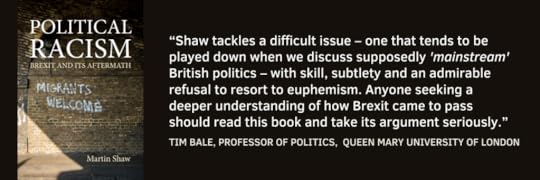 Going out from the warehouse in week beginning 22 March:
order
direct using the promotion code AGENDA25 for a 25% discount – saving £5 on the paperback (but you do have to pay postage).
Going out from the warehouse in week beginning 22 March:
order
direct using the promotion code AGENDA25 for a 25% discount – saving £5 on the paperback (but you do have to pay postage).
February 12, 2022
New cover for ‘Political Racism’
We’ve changed the cover for Political Racism: Brexit and Its Aftermath, due out at the end of March.
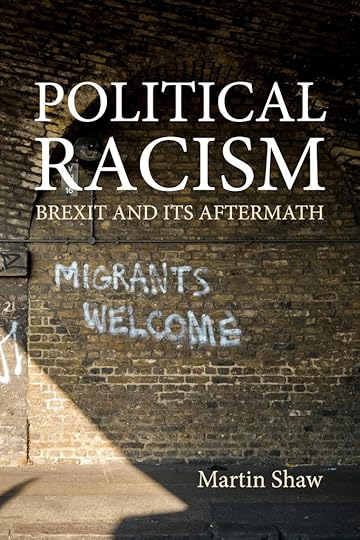
October 11, 2021
As the new Brexit crisis deepens, Johnson pulls the immigration lever
As Britain’s supply, cost of living and health crises deepen, Boris Johnson’s pivot to a “high wage economy” in his conference speech has set the cat among the pigeons. While his address was in many ways as empty, verbose and economically illiterate as many have pointed out, it was not entirely devoid of meaning. Rather, it was – like his recent reshuffle, which promoted the culture warriors and retained Priti Patel – a clear signal that he is doubling down on his modus operandi. Shapeshifter Johnson may be, but mostly he’s just shifting the language in ever more expansive rhetorical flights. The substance is remarkably consistent, and pace all those who keep looking for a “new” Johnson, the old one – or at least, the one he created in 2016 and doubled down on in 2019 – is still very much driving things forward.
The key to understanding what is going on is that Johnson once again pulled the political lever of immigration when said that “the way forward for our country is not to just pull the big lever marked ‘uncontrolled immigration’”. Looked at in this light, the alarm of the free-marketeers about the “high wage economy” is rather overdone. If Johnson is “leaning right on culture and left on the economy” – the formula which the right-wing academic Matthew Goodwin pioneered seems to have taken off at high levels – so far this is just another rhetorical pitch in the direction of what “culture” euphemistically represents, i.e. anti-immigrant racism.
Thus the “high wage economy” is not an economic or social strategy, but a new way of reviving the political racism of Vote Leave, at a point when it’s becoming clear that the real economic problem is the lack of immigration from the EU which its victory and Johnson’s policies have caused. The “high wage economy” is an audacious new ideological device and – unless its initial outing proves a failure with Tory voters as well as the economically literate – we may expect to hear much more of it as the problems of Brexit mount. However its underlying political message is that, despite how the matter appears to economists, the task of controlling immigration is still the top political priority and explains away the growing shortages.
We should not really be surprised at this turn of events. As Johnson sealed the UK’s exit from the Single Market nine months ago – the moment at which its current problems became inevitable – Philip Collins argued in the New Statesman that “when levelling up proves to be impossible, and when the rift in its electoral coalition opens, the Conservative Party will return to immigration in desperation. It will have to. With no European Union to act as a receptacle for grievance, immigration will have to be made more salient again”.
Disregarding the unrealistic assumptions that that the Tories had ceased to pursue immigration themes – the mass deportations, campaign against asylum seekers and every word Priti Patel uttered said otherwise – and that the thin agreements with the EU would stave off conflict rather than providing new occasions for it, the point was well made. “Immigration”, the core issue of nativist racial nationalism, would return with a vengeance if the Tories’ situation became critical.
That moment is now upon them. Cornered by the mess that Johnson’s Brexit has caused in Ireland, they appear to be preparing a high-stakes showdown with the EU, while shortages are really biting across Britain. The Tories may have “had the time of their lives” in Manchester, but a remarkably wide range of people across Britain are not, by any means. Presumably their next tune will be the old favourite, “Things can only get better”, but this rhetoric can only work if their core voters among the older, comfortably off, racially and nationalistically inclined are sufficiently immune to material inconvenience to stay loyal, while the rest of the electorate is confused and demoralised enough to fail to unite against them. Despite the right’s successes over the last five years, it’s quite a tall order.
By forefronting immigration once again, through the Orwellian rhetoric of “higher wages”, Johnson has confirmed that the political racism of 2016 remains his go-to method to sustain the Brexiter Tory base through the new crisis. However it is not clear if this will be enough to carry him through to victory in a new general election, which is what he needs to protect himself from a richly deserved reckoning.
September 25, 2021
NEW BOOK: Political Racism: Brexit and Its Aftermath, out in March 2022
“Brexit is a phenomenon of organized racism, which remains a guiding thread of the regime to which it led.”
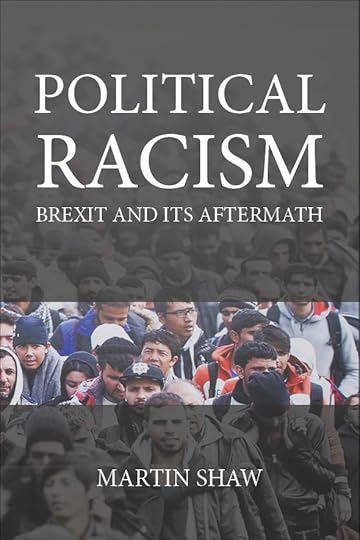
Exciting news: my study, Political Racism: Brexit and Its Aftermath, will be out at the end of March. The book develops an innovative general argument about the role of organized hostility in today’s racism and the mainstreaming of far-right politics, developing themes such as the relationships between strategic and structural racism, between ‘nativism’ and ‘selective racist’ ideas, and a wide-ranging critique of the denial of racism in immigration politics in general and Brexit in particular.
Its examination of its role in Brexit and its aftermath, offers (I believe) the fullest analysis of racism in the rise of the Brexit movement, its ideology, the 2016 referendum itself (of which it offers an important revisionist account), and how the racist impact of the referendum helped structure the Brexit process and conflict in 2016-19, Johnson’s victory and the current nationalist Tory regime.
Available to order from the PUBLISHER’S WEBSITE.
Contents
Acknowledgements
Introduction
1 Conceptualizing Racism and Political Racism
2 Political Racism and Immigration
3 The Europhobic Movement and Its Ideology
4 Racism in the Referendum
5 Embedded Racism in the Brexit Conflict
6 Johnson’s Victory and the Nationalist Tory Regime
Conclusion
Hardback£65.00 | $95.00ISBN 9781788215077
Paperback£19.99 | $30.00ISBN 9781788215084
e-book£19.99 | $30.00ISBN 9781788215091
192 pages | 234 x 156mm | 30 March 2022
Martin Shaw's Blog
- Martin Shaw's profile
- 6 followers


